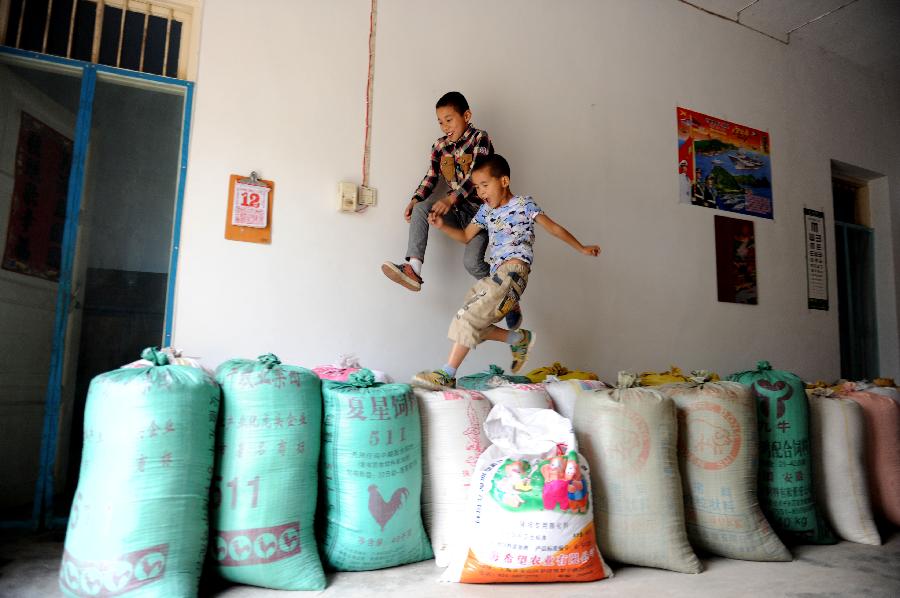Technology, management ensure food security in China

Children play on sacks of grains stored at their home in Feixi County, Central China’s Anhui Province. A significant proportion of China’s food is temporarily stored by individual farmers.
The International Symposium on Food Security and Its Future was held by the Nanjing University of Finance and Economics (NJUE) in Nanjing to commemorate the 36th World Food Day on Oct. 16.
Currently China’s food security is facing a complex situation in which high grain outputs coexist with massive grain stock and imports, said Cheng Guoqiang, a research fellow from the Development Research Center of the State Council.
Speaking on loss after grain output, Zhang Qiang, a professor from the Department of Biosystems Engineering at the University of Manitoba, said great wastage occurs during the process of harvesting, storage, processing, consumption and cooking.
The total grain loss rate after output is about 1 percent to 2 percent in developed nations. The rate in China is about 15 percent, Zhang said. This includes not only the loss of grains outputted but also of initial investment, such as fertilizer, irrigation and labor, he said.
Yuan Jian, a professor from the College of Food Science and Engineering under NJUE, said China’s food security faces universal problems, such as small production scale, diverse varieties of grains, inadequate or poorly equipped storage and the need to improve the processing technology for refinement.
There are also the problems of residues as well as an excess of heavy metals and biotoxins that come from the environment, soil and climate, Yuan said. Furthermore, there is improper seed selection and misuse of chemical fertilizer and pesticides, said Wang Shuo, a professor of food safety at Tianjin University of Science and Technology.
The development of science and management—together with the improvement of the policy system—has formed the basis for resolving problems related to food safety. For example, in food testing science, the current equipment and instruments are able to accurately detect heavy metals, biotoxins and additives, Yuan said, adding quality assurance needs to be implemented during the process of purchase and output.
In regard to food supply security, the supply-side reform of the food industry should be pushed forward, Cheng said. The government should restore the market mechanism, eradicate the policy market in food industry and establish a set of rules and order for competition that is fair, predictable and market based, he said.
In order to achieve the sustainable development of the food industry, Zhang said one of the important policies we should take is to reduce grain loss by technological means.
For example, in food storage, the loss rate of individual farmer storage is higher than national storage, and considering a significant proportion of China’s food is temporarily stored by individual farmers, it is imperative to reduce the loss in individual storage. China should promote the integration of harvest and storage, and a storage system that suits China’s household farmers, he said.
The development of the industry of healthy food should be taken into consideration in future policymaking in food safety and food industry, said Sun Baoguo, president of Beijing Technology and Business University.
Considering that China has the most abundant food resources in the world, the nation should develop technologies to create more nutritious, healthy food with more added value, Sun said.
Wang Guanglu is a reporter at the Chinese Social Sciences Today.

 PRINT
PRINT CLOSE
CLOSE